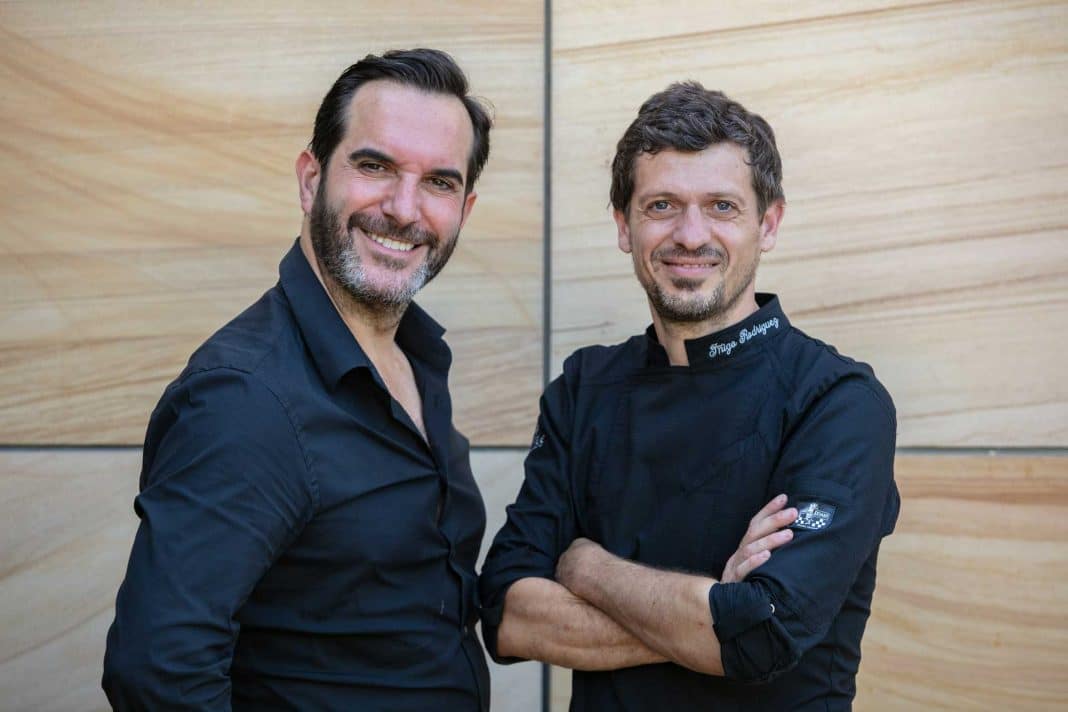With his two Michelin stars and three Repsol Suns at his restaurant Coque, in Madrid, chef Mario Sandoval has earned the respect of gastronomy lovers inside and outside of our borders. In addition, his vast knowledge gastronomy, the land and its products, have led him to introduce a sustainable philosophy that has also earned him his first Michelin Green Star. Sandoval arrives in Ibiza this season with ASAL with Íñigo Rodríguez at the helm in the kitchen.
What is ASAL?
It’s the first time we’ve left Madrid with such an original concept. Talking and working with Íñigo, who despite already having vast experience, came to train with us at Coque, and we focused on the salt flats of Ibiza and Ibiza’s salt. There are many stories behind it: The old saying goes that the salt was not passed from one pair of hands to another, that one took the salt oneself because if it spilled you got paid less. And it’s a fascinating product.
How do you incorporate it into the restaurant?
We started to transform the texture of local Spanish products with the salt -by brining, salting, curing, and with the essential ingredient of time- of fruit, vegetables, fish and meat. Marvellous, elegant things happened, and with unique textures. So salt is the central theme at the restaurant, in that it shows a respect for the salt of Ibiza, for the history of the Phoenicians and the Romans, and what this product has represented in this part of the Eastern Mediterranean: Denia, Ibiza, Mallorca…
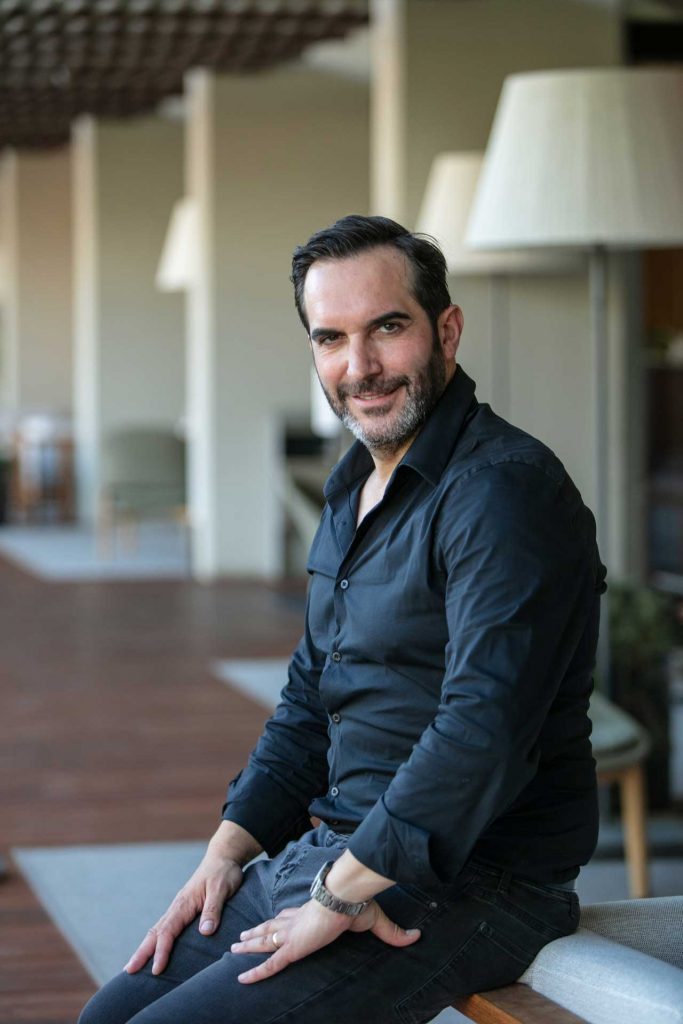
What is the guest who sits down to dine at the restaurant in the Ibiza Gran Hotel going to find?
The menu is comprised of starters for sharing, individual starters, fish, meat and desserts. There are around 40 references on the menu. It’s an open menu, because Íñigo has daily dishes that change if a certain fish arrives from the fish market or some meat, which we prepare on the grill… He’s going to have his say, and what’s more there will be a change of dishes each month.
Íñigo Rodríguez: It’s an open, elegant menu. Dynamic and exciting.
The fusion of local language and creativity comprise the restaurant’s menu
What is your relationship with Ibiza?
It’s a great relationship because I’ve been coming here on holiday for ten years already. My wife’s cousin lives here and she has four children, just like us, and they are all around the same age. We’ve always come to Ibiza.
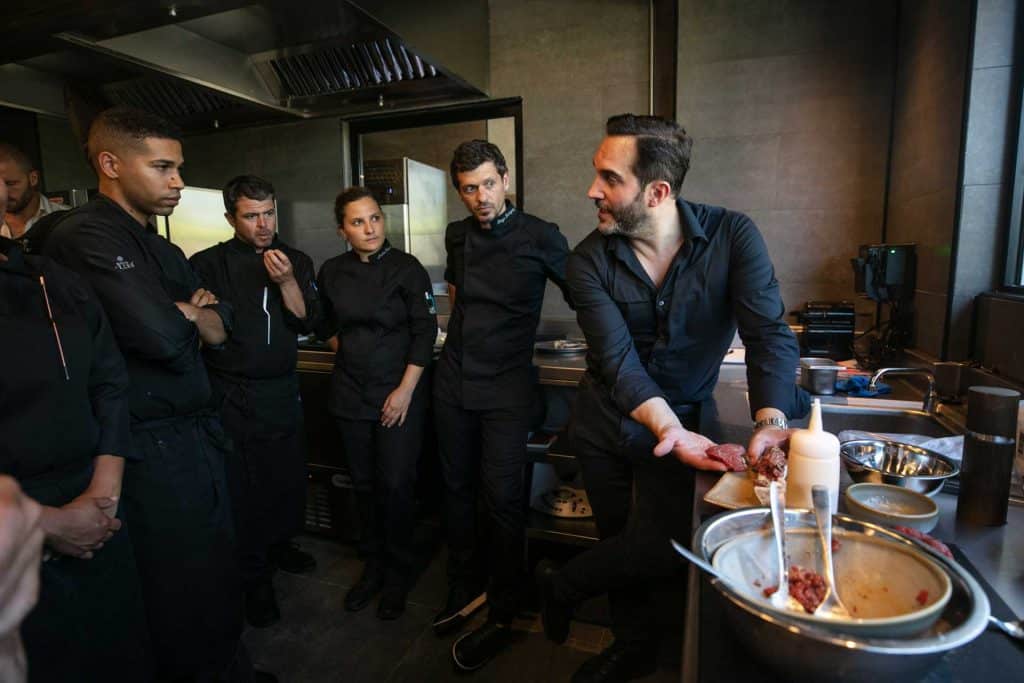
And how is ASAL working on the island?
I know Raúl very well, the manager of the Ibiza Gran Hotel, and Óscar Molina, chef at La Gaia, we first met about 15 or 20 years ago at the National Chefs Competition and our friendship started from there. I’ve always supported him. In fact, we did a four-hands session a few years ago at La Gaia. The owner and his wife came here, they liked the place, and they had thought of bringing another chef over from London but he was already committed elsewhere, so they came to me after talking to Raúl. They came to Coque for lunch and they loved the philosophy, my brothers, the service…they loved it. And I was lucky enough to find this gem of a man, Íñigo.
I.R.: They introduced us and there has been great synergy and mutual learning at all times.
Is ASAL anything like Coque, your restaurant in Madrid?
Coque is another story, it’s built on a history of achievement, reflection, maturity and techniques garnered over more than 30 years. Whereas, this has been done specifically for the project. We needed local cuisine, which Íñigo has a deep knowledge of, we needed the local language, which he also dominates because he has been in Ibiza for 15 years. Everything that has happened has evolved from our conversations and work together. He knows the taste of here, he knows the suppliers and the local language much better than I do. The fusion of that local language and creativity is the restaurant’s resulting proposal. It would have been impossible to do it so quickly, in just four weeks, if he hadn’t been there.
What kind of products do you like the most, which ones have you included on the menu?
ASAL is very centred on the sea and vegetables, although we also serve meat. The owners are vegetarian, they like light food and fish. Therefore ASAL is very geared towards this type of food and offers vegan and vegetarian options. Watermelon, lettuce, avocado…
How did you manage to get all this together in such a short time?
I.R.: I worked at Coque for three weeks, that’s where the initial concept took shape. And in just two months we have been putting a team together, organising everything, doing building works…
And now [end of June] it’s time for the fine tuning, making a general test of the dishes with all the team.
Yes, now comes the best part. It is like an actor who learns the role and then has to act it. The best part is to enjoy the performance. The work my cousin has done here, and me at Coque, it’s been hard work. This yes… this no… it seems better this way… but it’s been great. Today we’ve tested many of the dishes we have on the menu in order to profile them.
an urban restaurant can generate more toxic material than an entire town
You belong to the third generation of caterers in your family.
Yes, first is was my grandparents, then my parents and now it’s our turn. I have a daughter called Daniela who can make the most amazing sponge cakes at just eight years old. It’s in our blood
How has the way we sit down to eat changed since your childhood, or since you began to work professionally in the restaurant, until now?
Gastronomy has come such a long way in these 22 years. We’ve seen the introduction of informality, without a tablecloth, which has broken the starter, main and dessert scheme, and a lot of research has been done into the culinary techniques that have been exhibited at international congresses. But not only displaying the techniques but then refining them: freeze drying, sous vide cooking…
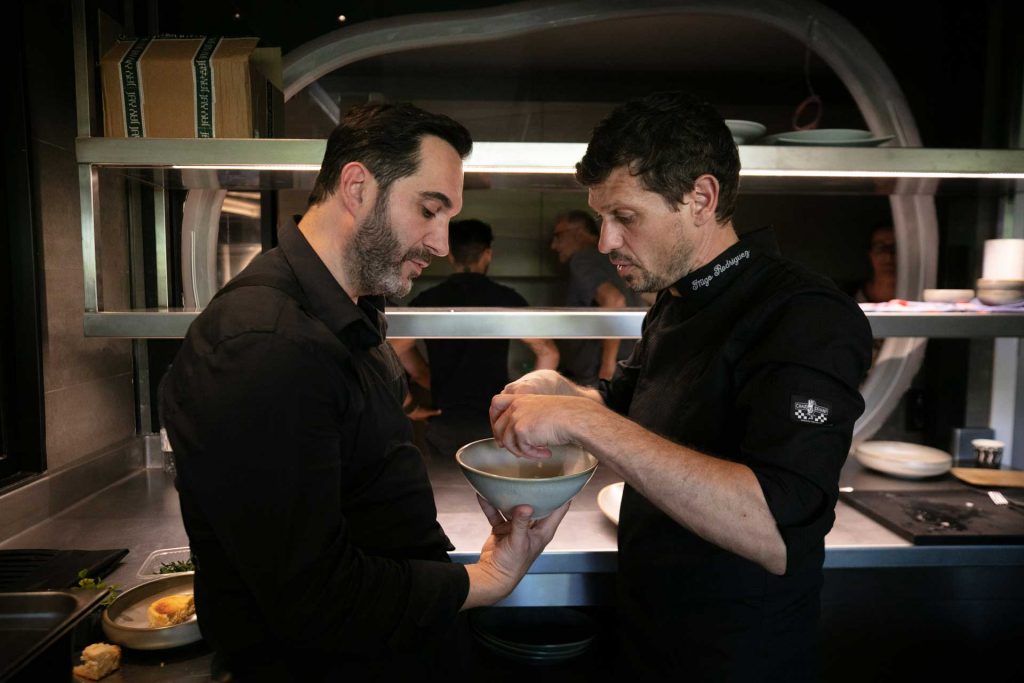
Cooking congresses open up new possibilities, how do these innovative techniques reach restaurant kitchens?
There is a part of reflection on the techniques presented to us at congresses and they have opened the way to creating different things. This technique that we have used with salt is ancestral, but I don’t think that anyone has ever focused on this concept before in Ibiza.
What do you achieve by using salt?
You get textures that are elegant, smooth and different. Where fish like monkfish, tuna and longfin tuna acquire unique textures.
I.R.: I come from a fishing village in Bermeo where we ate tuna all the time, but never with this texture.
What are the processes for cooking with salt as the medium?
The basis is that time is another ingredient. The salting is done with one part salt, at least one part sugar, and then the polyphenols of red wine. You colour and cure the fish, and depending on how long is stays in the salt, you obtain a different texture. So time is essential, and the end result is surprising. Because you think its looks good, you take it to your mouth expecting one thing, but it contains some of the oil extracted from a brine with sherry… and you realise it’s just like silk. Sounds simple, but you’re surprised when you try it.
Customers at ASAL, and in Ibiza in particular, are very fussy.
Customers in Ibiza are extremely discerning. I’ve lived in Cala Jondal, where you eat well and it costs a lot, but no one complains. We’re used to going to one of the island’s beach bars and eating an expensive meal, but you don’t eat what you should be eating. However, here for example, in Cala Jondal, you eat and pay a high price, but you are happy.
ASAL came about in a different context, in tune with the beach.
ASAL is going to be a bubble in Marina Botafoc, in the centre of Ibiza. It’s a place that considers all the details, the comfort, the experience, the music, the serving staff, and the chef reflects on the product… It’s aimed at selective people and gourmet lovers, discerning people. The design is spectacular, it simulates the waves created when the salt enters the rock and disintegrates.
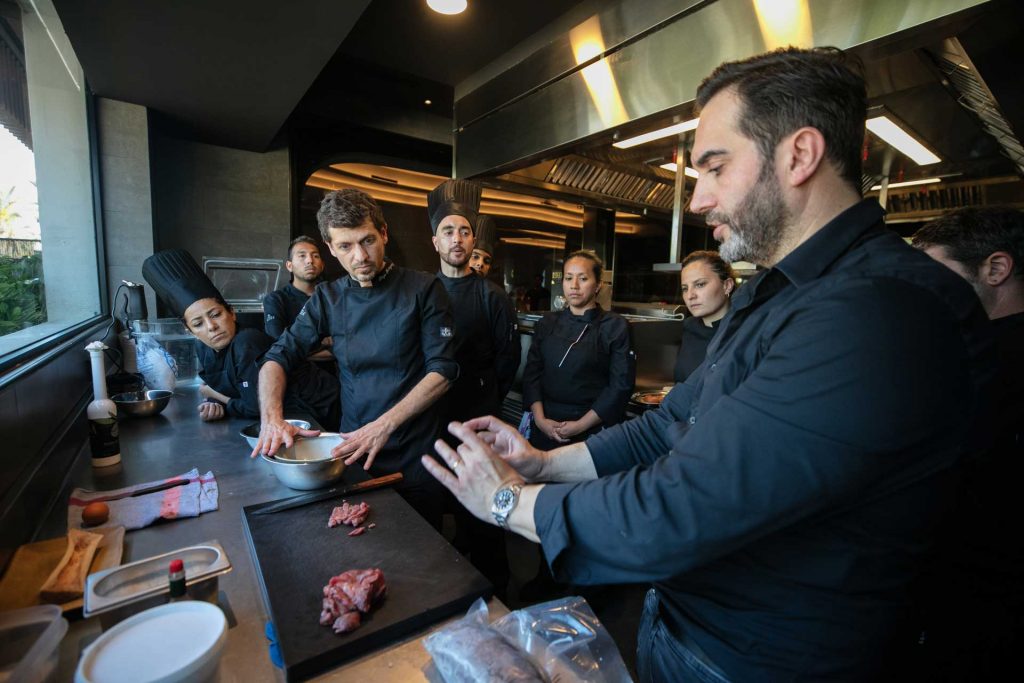
Coque was awarded with the Michelin Green star for sustainable practices. How are you going to apply this philosophy here?
We are going to pursue it here. This year we’ll be making a report on everything we do: how the restaurant is managed, how the products are obtained, how green energy is applied, the use of recycled material, etc. This is the path we will follow. This year when I stepped up to collect the Green Star with Joan Roca, with Jesús Sánchez from Cenador de Amós, Santi Paura… We were eight very sensitive individuals. It’s the most highly regarded star and all restaurants want to have one. It gives you the value of the path of the future, that others look at how you work.
Is it easier or more difficult to apply this sustainable philosophy here in Ibiza?
Much easier, because Íñigo is in touch with all the local producers: we have salt from Ibiza, oil from Ibiza, lamb, suckling pig and lobster from Formentera…
I.R.: Everything that we can use from the island gets delivered to our kitchen. Being from the island doesn’t mean only preparing local recipes, it means using its products.
And in the kitchen what advice would you give to restaurants that want to go down this same path of sustainability?
Sustainability is a job that starts when you get up in the morning: your suppliers, your workers and the use of single-use plastics. We don’t buy any, all our bags are recyclable. It’s a personal philosophy that you convey from your home to your workplace. An urban restaurant can generate more toxic material than an entire town: Porexspan packaging, not recycling, oil, plastics… Íñigo has to convey all those values in the restaurant. 100% product utilisation. Today, for example, in lobster rice, we have taken advantage of everything: the antennae, the tail, the essence…
Everything. This is the best part. There’s a part of personal philosophy. And it’s easier or more difficult. It’s difficult everywhere, so in the end Ibiza is the same as Madrid.
I.R.: In Ibiza not only has the gastronomy evolved, but so have the suppliers. When we talk about gastronomy, we only talk about the cook, but all around this movement are the producers, fishermen, farmers… It’s a whole entity.

